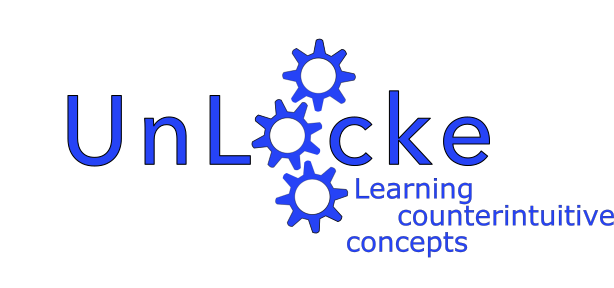UnLocke is an innovative computer-based learning activity designed to help children in Years 3 and 5 stop and think before tackling problems in science and maths. A friendly character, named Andy, poses tricky questions to three virtual game-show contestants who demonstrate correct and incorrect thinking. Children complete various tasks as if they are taking part in the game-show. The tasks have been carefully developed to meet the content of the national curriculum for each age group.
UnLocke is part of a research and development project funded by the Education Endowment Foundation (EEF) and Wellcome Trust (click here to find out more). As part of the project, we will be following the progress of schools who are using UnLocke at the start of their maths and science lessons.
The project is split into three stages...
Our experts are working to refine UnLocke, making sure that it meets the learning needs of Year 3 and 5 pupils.
As part of Stage 1, 8 primary schools will receive a pilot version of UnLocke with a training session from one of our team for free. Over a 10 week period, participating classes will use UnLocke at the start of maths and science lessons, 3 times per week, for 15 minutes. This will take place for 5 weeks during November and December, before the Christmas break in 2016, and will continue for 5 weeks after Christmas.
We will follow the progress of these schools in order to find out what we may need to improve. This is an important part of the project, as it will help us to prepare UnLocke for the larger trial in Stage 2.
Schools involved in the pilot are welcome to recieve the final version of UnLocke when it becomes available.
Once we have finalised the UnLocke programme, children in 100 primary schools across the UK will use UnLocke at the start of their maths and science lessons. We will run half-day training workshops for teachers and teaching assistants, to explain the background of the project and their involvement in its implementation. Over a 10 week period, participating classes will use UnLocke at the start of maths and science lessons, 3 times per week, for 15 minutes.
While most classes will be given this computerised learning activity in maths and science lessons, other classes will be given a similar computerised activity to use in PSCHE lessons instead. The PSCHE version focuses on the use of social skills in learning, rather than on misconceptions in maths and science, and will function as a control condition to allow us to evaluate the impact of the maths and science programme on children's learning of counterintuitive concepts.
As part of Stage 2, a small number of randomly selected children will be invited, on a purely voluntary basis, to take part in further cognitive assessments, including some brain imaging.. This will involve separate additional consent from parents and will help us to see the effect the learning activity has on the brain.
In addition to our own research, NFER (see below) have been commissioned by EEF to conduct an independent evaluation of the impact of UnLocke. This will involve a short specifically designed task measuring inhibitory control, and completing a pen-and-paper standardised math and science assessment.
Now that the 10 week programme has been completed, we are currently analysing the data and collecting feedback from the participating schools on their experiences of using the learning activities and ways that it can be improved. We will be ready to feedback our results once we have analysed all our data and will be organising dissemination activities next year in 2020!
For results of the evaluation report by the NFER click here.
We have been further developing and improving UnLocke’s computer-based activities to be adaptive and individualised. This means that when children engage in the activities alone on a computer, the program will adapt to their knowledge and skill level, to make sure that they get the support that they need to succeed.
Stage 4 will involve two research studies (Study A and Study B) with Year 3 pupils.
Study A will take place in November 2019. Children will be invited to use the unLOCKE software on a researcher’s computer for one 15-minute session. Participating children will be randomly allocated to use one of four visually different versions of the UnLocke science and maths concepts software. We will use eye-tracking software to analyse where each child is looking on the screen during their use of unLOCKE. We will use this information to choose the best user-interface design for individualised use of the software going into Study B.
Similar to Stage 2, participants who take part in Study B will use UnLocke at the start of a maths or science lesson over 10 weeks (February to May 2020), 3 times per week, for 15 minutes. This will be preceded and followed by a short series of cognitive tests. All classes will be given the same individualised intervention. We will use the results from this study to understand better how individualised, computer-based, inhibitory control training activities can improve children’s counterintuitive reasoning skills in science and maths, as well as to inform the design of future adaptive educational interventions.
- Neuroscience evidence suggests it will be effective. Click here for further information
- You will be part of an initiative to bridge the gap between neuroscience research and education practice
- You will have the opportunity to collaborate with neuroscientists with the aim of finding out what does and does not work in the classroom
- Teachers/Teaching Assistants will receive training to give them an understanding of the neuroscience background and context of the study
- You will have access to the UnLocke learning activity for use after the trial
- You will be provided with the results of the standardised math and science assessments run by NFER as part of the evaluation of the UnLocke project
Stage 4 of the project will be evaluated by UCL and Birkbeck research staff, using similar methods to previous evaluations. Additionally, we will investigate how interactions in the individualised software relate to improvements in cognitive outcomes (e.g. counterintuitive reasoning).
Year 3 and 5 classes from Primary schools in London and the surrounding areas can volunteer to participate in Stage 1 of our project. For Stage 2, we are looking for Year 3 and 5 classes from state primary schools across England, but especially in the North-west, Midlands and South-west.
For Stage 4, we invite Year 3 classes from the greater London and West Midlands areas to take part in our research. While any class can take part in Stage 4 Study A, Study B requires that the class has access to computers for 15 minutes, 3 days a week, for the 10 week duration of the study.
We are currently recruiting classes for Stage 4 of UnLocke! Click [here (link)] to sign up now. If you wish to be kept up to date with the results of the UnLocke Project and any further activities, please email unlocke@psychology.bbk.ac.uk.
The study has received full ethical approval from our ethics committee, following the guidelines of the British Psychological Society
All research assistants who will be working with the schools will have full enhanced DBS checks.
In 2020, we will hold workshops for all participating schools where we will feedback the results from Stages 1-3 of the project. NFER will also publish its report on the impact of the UnLocke project. This will be available through the EEF website shortly afterwards.
The results of Stage 4 will be written up in a report by researchers at UCL and Birkbeck and distributed to participating classes and schools in 2021.
For results of the evaluation report by the NFER click here.
In order to test the impact of UnLocke, the classes taking part will be randomly selected to either (1) use the UnLocke activity, (2) the alternative social skills based activity, or (3) continue with their usual teaching activities. This design is known as a randomised control trial. It aims to demonstrate the effect of each activity, both science/maths and social, by comparing their effects, and also comparing these to the effect of usual lessons. Each of the groups is essential for evaluating the impact of the UnLocke activities, so it is very important that all classes stick to their group and complete the activities as instructed throughout the whole trial period.
We are currently recruiting classes for Stage 4 of UnLocke! Click [here (link)] to sign up now. If you wish to be kept up to date with the results of the UnLocke Project and any further activities, please email unlocke@psychology.bbk.ac.uk



